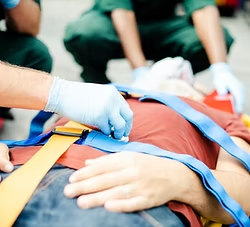
Poisoning is a completely common crisis that happens to anyone, be it a child ingesting household chemicals accidentally, an adult eating contaminated food, or a person getting exposed to poisonous gases or plants. Harmful chemicals come in many forms liquid, solid, and gas and can be brought into the body through swallowing, breathing, contact with the skin, or even eye exposure. The effects of poisoning may range from mild discomfort to deadly crisis, and having the capability to respond immediately and safely can mean the difference between life and death.

There are countless causes of poisoning, from chemicals and medicines found around the house to some plants, metals, and even foods. Children are especially vulnerable because their small stature means they can die from even tiny amounts of a toxin. Adults are also susceptible, particularly if they have underlying illnesses or are continuously exposed to poisons. Food poisoning is also a frequent culprit, induced by bacteria, viruses, or toxins in contaminated food or water.

We must be aware of the symptoms of poisoning. The symptoms can occur in minutes or hours, depending on the poison and amount. Some of the usual symptoms include nausea, vomiting, diarrhea, abdominal discomfort, confusion, dizziness, change in heart rate or body temperature, shortness of breath, rashes on the skin, and irritation of the eyes. In its more advanced stages, poisoning can lead to convulsions, loss of consciousness, or even death. Chronic exposure to certain poisons, like heavy metals or gases, may lead to symptoms that build up over the course of time, e.g., lung injury or neurologic illness.

One of the myths is that vomiting as a cause is an acute treatment of poisoning. Parents and caregivers were once reminded to induce vomiting after eating a poisonous substance. Nowadays, professional medical opinion strongly advises against this unless it is done on the orders of a medical expert. Inducing vomiting will typically worsen the situation, especially if the poison is one that dissolves things like acid or alkali, or a petroleum product like gasoline or paint thinner. Raising these chemicals up will cause serious burns or additional harm to the mouth, throat, and esophagus and even potentially life threatening conditions like pneumonia if the vomit is aspirated into the lungs.

Ipecac syrup, a familiar staple in home medicine cabinets years ago, is no longer suggested to use on a regular basis. The syrup is only safe for very limited purposes, and even that only under direct medical supervision. Ipecac in excess is not only going to damage the heart and muscles, but frequent use or use for weight control is extremely hazardous and potentially fatal. In infants less than six months old, ipecac should never be given except under the advice of a physician. In case there is no vomiting following the dose advised, expert medical attention is immediately needed.

What then do you do if you suspect the victim is poisoned? Calm down initially and assess the situation. If the victim is conscious, awake, breathing normally, and able to swallow, first aid can be begun while you call in an expert. For swallowed poisons that scald the throat or are irritating to the throat, a small amount of water or milk may be beneficial but only in an awake individual. For poisoning of the eyes, flush eyes with running warm water for 15 to 20 minutes, blinking continuously. For skin exposure, remove clothes and wash the skin with water thoroughly. If the poison is inhaled, move the person to fresh air immediately.

But if the individual falls down, has a seizure, is having trouble breathing, or loses consciousness, call emergency services immediately. After administering any initial first aid, phone Poison Control at 1-800-222-1222 for professional advice, even if there are no symptoms as yet. Be prepared to offer details such as the individual’s weight, age, medical conditions, amount and type of poison, how it was ingested, and what first aid has been administered.

Treatment of poisoning by medical means also varies depending on the causative agent. In some cases, supportive treatment and mere observation might be all that is required. Other instances may require antidotes, activated charcoal, or stomach pumping, but this should be performed by medical professionals. For food poisoning, most people are back to normal in 48 hours without the use of medication, although fluids and electrolytes lost must be replaced so that no dehydration occurs. Some illnesses may require intravenous fluids or antibiotics in a medical facility if the case is diagnosed as a bacterial infection.

It is dangerous to try home treatment of poisoning with induced vomiting or with over-the-counter drugs without medical advice. Vomiting does not completely empty the stomach and can delay more effective treatments. Some emetics, like sodium chloride, can cause potentially lethal electrolyte imbalances. The optimal thing to do is always to seek professional help and follow their instructions.

Awareness of the risks and taking the appropriate action can prevent you and your loved ones from suffering the potentially lethal consequences of poisoning. Rapid action, proper guidance, and avoiding the use of outdated cures like vomiting are all needed for a more favorable outcome.
Related


